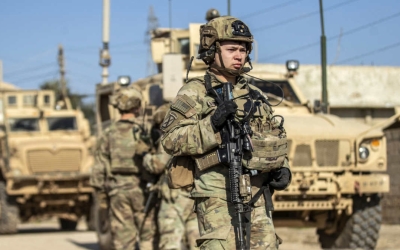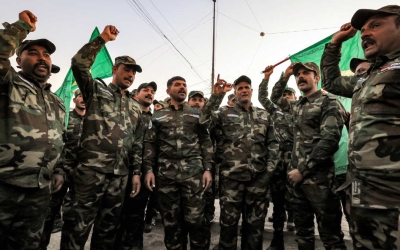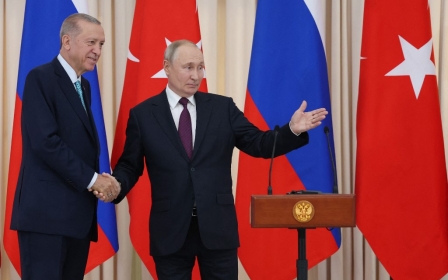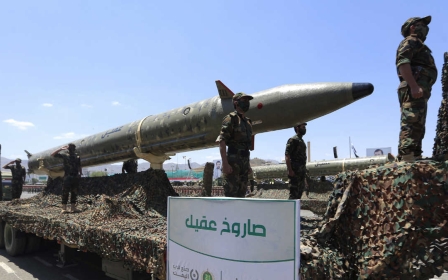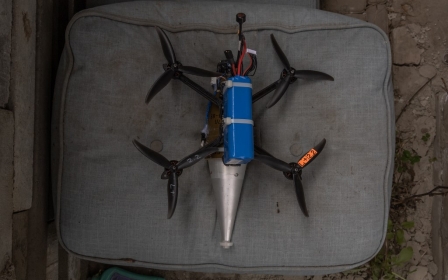US shrugs off Baghdad's bid to broker Turkey-Syria talks
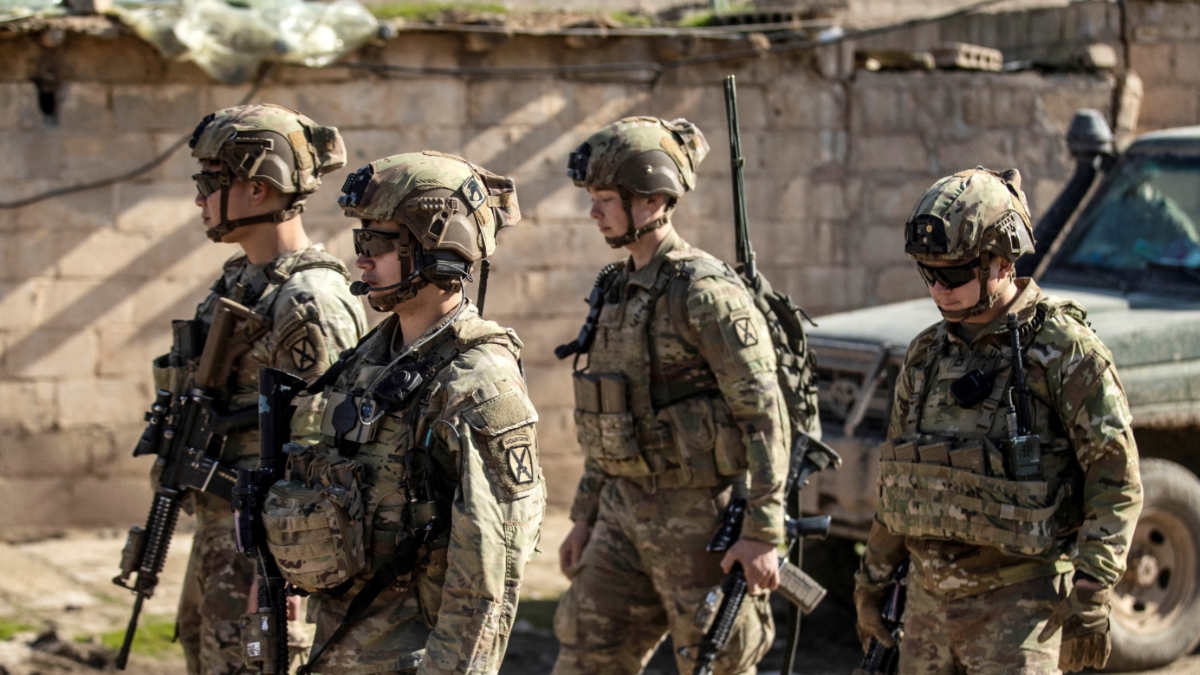
Iraq’s efforts to broker a reconciliation agreement between Syria and Turkey could bring Iran closer to its long-term goal of expelling US troops from northeast Syria, but with the Middle East on fire from the war in Gaza, senior US officials are shrugging off the prospect.
US officials paid lip service to the topic during their meetings with Iraq’s Foreign Minister Fuad Hussein in Washington earlier this month, two former US officials and one current Arab official told MEE.
“Iraq told the US before it started this process that it was working on a reconciliation agreement,” the Arab official told MEE. “The US has been indifferent”.
While Washington continues to officially oppose its partners normalising with Damascus, it has all but given up actively enforcing the policy.
In May, Syrian President Bashar al-Assad was in Bahrain to attend his second Arab League summit since his debut reappearance at the summit in Saudi Arabia in 2023. Last week, Syria and Saudi Arabia resumed direct flights, expanding connections Damascus already has in the Gulf beyond the UAE.
New MEE newsletter: Jerusalem Dispatch
Sign up to get the latest insights and analysis on Israel-Palestine, alongside Turkey Unpacked and other MEE newsletters
If successful, Baghdad’s bid to achieve a reconciliation deal between Turkey and Syria could be more impactful for the US, analysts say, because of the US military mission in northeast Syria.
“The long-term implications are clear,” Robert Ford, the former US ambassador to Syria, told Middle East Eye. “Assad is too weak to do much against the Americans, but it’s easy to imagine that Syria and Turkey, working together, could squeeze the Syrian Democratic Forces (SDF) out”.
Syria-Turkey talks jolt SDF
US troops arrived in northeast Syria in 2015 as part of Operation Inherent Resolve to defeat the Islamic State (IS) group. The Kurdish-led SDF was their main partner. The IS group's self-described "caliphate" was territorially defeated in 2019, but roughly 900 US troops remain in the area.
Officially, their mission is to conduct raids against IS sleeper cells, but they have become a chip in the region's geopolitical chessboard. Privately, some US officials have come to see the US presence as denying Assad, and his Iranian backers, access to territory.
Syria's decade-long civil war ended with Assad controlling about two-thirds of Syria. The semi-autonomous region of northeast Syria, also referred to by Kurds as Rojava, constitutes the other roughly one-third. Driving the US out of the northeast is a long-term goal of Assad, Russia and Iran.
More US officials, however, are coming to see the US military mission as a burden, analysts and former officials say.
“If your top concern is to keep Iran’s 'axis of resistance' in check, you will not like to see talks advance between the Turks and Assad,” said Douglas Silliman, former US ambassador to Iraq from 2016-2019. “But this isn’t seen as a football match, one side wins and one side loses.”
The debate in Washington between those in favour of remaining and withdrawing has played out since the Trump administration made an abrupt exit in 2019, only to partially reverse it.
The US’s most immediate concerns are al-Roj and al-Hol refugee camps, which are guarded by the SDF and home to 45,000 people - including the families of IS militants. Kurdish forces also guard over 9,000 IS members.
“It is not in Iraq’s interest to see security in those camps breakdown, if Baghdad can achieve a solution with its mediation, that could be in US interest,” Silliman said.
Turkey and Syria have been engaged in on-and-off talks for years to restore ties that broke down when Ankara backed Sunni rebel groups against Assad’s government, following the Arab Spring.
Russia, whose air force helped turn the tide of the Syrian Civil War in Assad’s favour, had taken the lead in mediating between the two sides, hosting Turkey and Syria's defence ministers and intelligence chiefs in Moscow in 2022 and 2023.
'If your top concern is to keep Iran’s Axis of Resistance in check, you will not like to see talks between the Turks and Assad'
- Doug Silliman, Former US ambassador Iraq
Erdogan has been eager for a deal with Assad, particularly as his government faces domestic backlash over the roughly three million Syrian refugees residing in the country amid an economic crisis, but Assad had been adamant in his opposition to Turkey's military presence in Syria.
Turkey invaded Syria in 2016, with the aim of depriving Kurdish fighters of a base along its border. In the following years, it launched more military forays that gave it and its Arab proxy militias control over large swaths of Syrian territory.
The US’s support for the SDF is a long-running point of contention with Turkey, which views the SDF as an extension of the outlawed Kurdistan Workers’ Party (PKK), a US-designated terrorist group.
MEE reported recently that Baghdad was able to achieve a breakthrough in the talks by convincing Assad’s government to drop its precondition of a Turkish withdrawal before negotiations take place.
Analysts caution that serious gaps remain between Turkey and Syria, but the progress is only going to reaffirm SDF fears that the US is resigned to abandoning its Kurdish allies.
MEE reported in March that a rare visit to northeast Syria by General Erik Kurilla, the top US military commander in the Middle East, did little to boost confidence among Kurdish officials, who have seen their semi-autonomous region pummelled by Turkish air strikes.
'Like ants'
Baghdad, home to US troops and Iranian-backed militias, has attempted to carve out a mediator role in recent years similar to Oman.
It won plaudits in Washington for positioning itself as a bridge between Jordan and Egypt to bolster economic and security ties. Later, it initiated talks between Saudi Arabia and Iran that Biden administration officials credited with helping defuse regional tensions. China sealed the final deal.
As much as Baghdad’s mediation puts more pressure on the US-backed SDF, it also signals a post-7 October Middle East, where the US partners are increasingly going it alone, forging deals they believe are in their national interest, that may also benefit Iran.
Prime Minister Mohammed Shia al-Sudani's Iraqi government may have felt it had an opening to mediate because it has courted Turkey, Silliman said.
Iraq outlawed the PKK and shrugged off Ankara's attacks on Kurdish targets in northern Iraq, Silliman said.
Turkish Foreign Minister Hakan Fidan also enjoys good ties with his Iraqi counterpart, Fuad Hussein, who is affiliated with the Kurdistan Democratic Party (KDP), a Kurdish party close to Turkey. Baghdad also wants to prevent a potential Turkish assault on northeast Syria.
Abbas Kadhim, head of the Iraq Initiative at the Atlantic Council, told MEE that Iraq has embraced its mediator role and is willing to stake out positions that conflict with the US. The two countries are set to hold talks this month on the future of the roughly 2,500 US troops in Iraq.
“Iraq is engaging out of self-interest. Let’s face it, it does not want Kurdish refugees fleeing a Turkish offensive,” he said. “Iraq will work to bring Bashar al-Assad and Erdogan together no matter what the US says”.
But Ford, the former US ambassador to Syria who is an outspoken critic of the US troop presence there, said it’s impossible to separate Iraq’s mediation from Tehran’s overall goal to oust the US from Syria.
One of the Iraqi leaders discussing normalising ties to Turkey with Assad has been Falih al-Fayyadh, the head of the Iran-backed Popular Mobilisation Forces (PMF), a group of Shia paramilitaries backed by Iran.
“Not everything that happens in Baghdad is controlled by Iran,” Ford said. “But what Iran has shown as the US is focused on Gaza, is that its friends can work like ants, to make incremental gains that benefit both themselves and Tehran".
Middle East Eye delivers independent and unrivalled coverage and analysis of the Middle East, North Africa and beyond. To learn more about republishing this content and the associated fees, please fill out this form. More about MEE can be found here.


